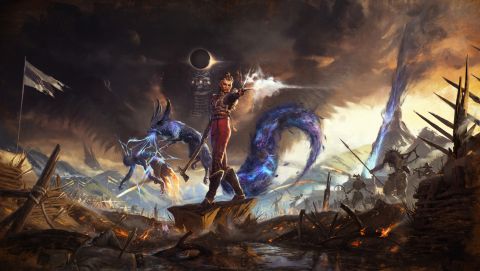Games featuring characters like Kratos, Bayonetta, Terra Branford, and many others have made god slaying a common feature. A new pair of god killers named Nor and Enki join their ranks, bringing action-RPG souls to Flintlock: The Siege of Dawn. It never quite rises to the top among its contemporaries, taking many cues from numerous genres without really making an impression in any of them. It tells the well-known story of being mistreated by the many gods of this world and getting obsessed with vengeance. Despite its lack of actual grandeur, Flintlock never ceased to amuse me during my 26-hour near-completionist run with its dazzling fighting and quick movements.
I joined the fan club for developer A44’s last game, Ashen, after it came out in 2018, a bit later than I should have, but once I did, I could not stop playing it—partly because it was so much fun to defeat the game’s bosses with a co-op partner. After six years, A44 has returned to Flintlock. Although the game’s appearance differs greatly from Ashen, it shares many similarities with Ashen in terms of combat, narrative, and general design. That is not to claim that is precisely the same, though, since efforts were directed into adding new mechanisms like an experience multiplier that heightens the typical risk-reward tension of souls like games, as well as making the combat more vicious and dramatic with some truly awesome finishers.
In the beginning, Nor is a capable and determined soldier seeking glory; I would categorize her as the “look before you leap” type. Her spouse, Enki, is a charming and strong god who has isolated himself from the outside world. His section of the story is by far the best because he has his motivations for helping Nor once her mission turns into one of retaliation. He helps her with his magical abilities and knowledge of his domain, and his enthusiastic yet modest curiosity upon discovering things he has missed makes him a valuable character.
Sadly, Nor’s vindictive story does occasionally veer into several clichés. Additionally, the spare cutscenes that are seen from the viewpoint of a different NPC that travels with them between locales frequently give the impression that important plot points are being left out. Although the relationship that grows between Nor and Enki throughout their adventure is not particularly novel, I enjoyed watching them all the way through and was curious to see what would happen if Flintlock had a sequel.
The prologue ends with a massive confrontation with an enormous enemy, but other than that, there is not much exposition before you are plunged into a war against the undead. This setup did not make me care about the war or the people I was fighting for. That is mostly because almost every NPC is reluctant to have Nor around or simply ignores him. Because you have fewer options for fighting, the first few hours of Flintlock can be a little difficult overall. This makes battles feel much shallower, and it scared me that the game might not develop enough to be engaging. It took a little longer than I would have liked, but thankfully that changes after you have access to more weapons and a few upgrades on the skill tree.
Four NPCs, excluding the main protagonists, join your camp and help by providing different weapon improvements; nonetheless, they are largely unmemorable, except for a quest chain involving a brother and sister in the group. It was one of those scenarios where you meet folks in the first hour of the film, and then hours later, they vanish and require saving or help. I think I would have assumed they were dead and forgotten about them if they had not been put on the main route. However, the assortment of NPCs encountered during side missions is more memorable: After liberating a town, I was able to access an arena run by two brothers and interact with a unique character that gave me alternate clothing, information, and an increase in my maximum health potions.
Combat moves quickly and fluidly; blows link into one another with ease, and you can feel the impact of every blow from your axes, hammers, rifles, grenades, and Enki’s magical skills. Additionally, Flintlock provides you with a variety of armor components that grant special abilities, such as doubling your attack range, exploding foes after stacking curses, or dividing grenades into two. You should stack at least two of these armor options for an improved effect, as they all have fixed bonuses. Later on, the system will extend to include more intriguing alternatives.
Verdict
Flintlock: The Siege of Dawn is one of those soulslike games that only gets better as you progress, unlocking more of the intriguing skills that let you fully utilize its attack chains and experience multipliers, even though the early going is a little difficult. To get the most out of it, though, you will need to venture off the main route to take on sidequests, locate optional fights, or engage with different NPCs to obtain upgrades and weaponry. Fortunately, Flintlock respects your time by making exploration enjoyable and simple through the use of fast travel, shortcuts, and other features. Compared to other RPGs, its runtime may be shorter, but it still makes good use of the time with engaging sidequests and a fantastic minigame. Though Flintlock’s narrative rambles a little in the middle and misses some opportunities to highlight its key characters, this journey did pique my curiosity about where Nor and Enki will head next.

